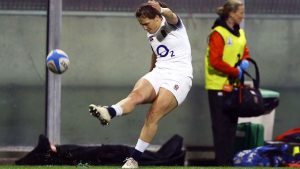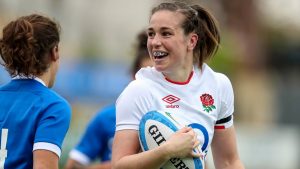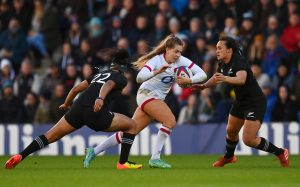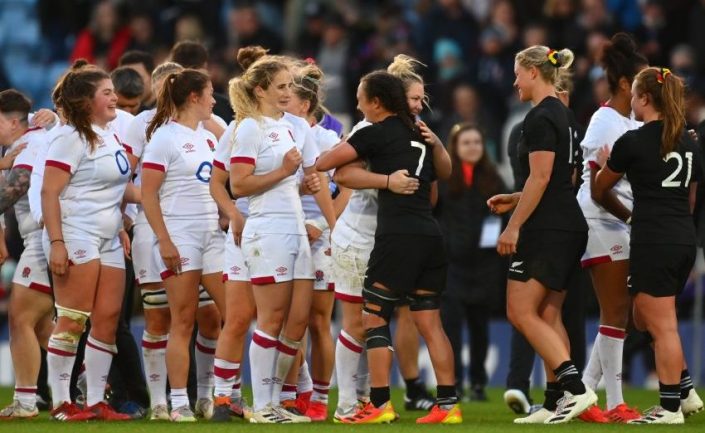A Glance at the Rugby Year in England
The fully professional Red Roses completed an undefeated year. Should we be surprised by that achievement? Other unions have not followed suit, either because of a different approach or lack of funding or indifference.

Source: ©INPHO/Matteo Ciambelli
Women’s Six Nations Championship England’s Katy Daley-Mclean kicks a conversion
Not surprised perhaps, but delighted to see how well they are playing, no matter who is representing them on the field at any moment.
If we go back a year to December 2020, we find the Prem 15s had started up only two months earlier; all other women’s rugby had been cancelled, and the game faced an uncertain future.
We had to set the Red Roses’ third consecutive Grand Slam against the news of Katy Daley-Mclean’s retirement from international rugby.
Red Roses
The most dramatic events took place during the much trumpeted New Zealand tour of Europe last autumn. The Black Ferns set themselves the stern task of playing England then France twice each to test their current strength as they battled against the effects of the pandemic.
We now know that the visit proved costly to them. They lost each game by a margin, to upset the odds of the delayed 2021 World Cup. It was no longer a given that they would retain the trophy in front of adoring crowds at Eden Park.

Source: INPHO
Emily Scarratt
In their place the Red Roses have continued on their winning ways. An end to their run of eighteen consecutive victories is likely to come only in their away match in Bayonne next April.
In the intro to the England France game at the Stoop in April the BBC offered a brief feature on Emily Scarratt. Maggie Alphonsi underlined how dependent the team was on her.
I was present as she suffered her broken leg in the first round of the current AP 15s at the Stoop. Her misfortune was a hidden blessing for the team. Could they play winning rugby without their talisman? Their strength in depth became apparent from that moment. Other players came riding to the rescue, and their presence in the squad brings up another issue that rugby has still to resolve, Sevens versus Fifteens.
7s – 15s
The very first of the new 15s contracts signed by Red Roses involved three leading 7s players, Scarratt, Mo Hunt and Jess Breach. More recently Alex Matthews, Helena Rowland and Holly Aitchison have also turned their backs on the abbreviated game, to make this autumn’s squad yet stronger.
The effect on the England 7s squad and the newly installed GB 7s squad has been considerable. GB recently finished tenth in Dubai; their overall ranking is sixth, and New Zealand were missing from the tournament.
The make-up of Scott Forrest’s squad keeps altering, much as England’s has done over recent years. There is bags of talent there, but victories aren’t coming often enough for their liking. By contrast the French are achieving fine results in both formats. Other nations like Australia (winners in Dubai) have placed all their eggs in the 7s basket.
Autumn Internationals
We’ve had some pretty special series away from the 6N, but the four games of the Black Ferns’ tour of Europe took on epic proportions.
They had a record second to none, not least five World Cups. England were missing leading figures like Katy Daley-Mclean

Hollie Aitchison of England takes on Patricia Maliepo and Ruahei Demant of New Zealand (Photo by Dan Mullan – RFU/The RFU Collection via Getty Images )
and an injured Sarah Hunter as guiding stars.
And no Scarratt. For the first test Middleton picked Amber Reed and Aitchison in the centre, only for Reed to succumb to injury before the match. Up stepped Lagi Tuima.
That left just one experienced figure in the backs, Lydia Thompson. Too green a line-up to face the mighty Black Ferns?
Kildunne, Aitchison, Dow and Harrison all scored tries, and the Ferns suffered their biggest ever defeat.
A week later at Northampton Rowland replaced Tuima at 12 and England ran riot, topping 50 points. Who needs Scarratt?
Hard to find a single English fan who would be prepared to see the Roses appear in New Zealand without her. But it’s a relief to know there is such talent available to the selectors.
If you’re an expert on how world rankings are determined, you’ll know how remarkable England’s current standing is. 96.26 strikes me as stratospheric.
Crucially the team’s main weakness, its scrummaging, disappeared as if it had never existed. Credit must go to Louis Deacon, the new forwards coach, and the players, old and new, who stepped up to create a sound platform for the fireworks out behind.
Summary
Played: 8
Won: 8
Points for: 385
Points against: 73
Premier 15s
January-May
Last season was so distorted by health concerns that the final was not contested till May. Harlequins achieved their great ambition of winning the title for the first time – inevitably against Saracens – at Kingsholm.
Their run-in had not been without hiccoughs. They were docked points for an infringement to pandemic-related regulations, which left them trailing behind the leaders for the rest of the season. But when it mattered, they raised their game to win 25-17.
The final table showed only minor adjustments. The three London clubs finished at the top; the two university-based clubs came next. Of the two newcomers Exeter made a positive impression; Sale showed other would-be entrants how difficult progress could be.
September-December
Everyone was delighted to say goodbye to the law adjustments brought in to allay worries about Covid-19 contagion.
More and more players signed on from the rest of the British Isles and abroad. Clubs have test players competing for the same position.
One major rejig to the competition was the introduction of the Allianz Cup, a move to cover the gaps in the programme when test matches take precedence. It allowed players not always included in the first team to get some proper competition.
That has helped club selectors test out alternative options for league matches when resources are stretched. But it has to be admitted that the Cup games fell under the radar during the high drama of the international break.
It was Bristol Bears who captured the headlines. New signings, new staff and the return of leading players, Amber Reed and Sarah Bern, allowed them to recover from a distressing 2020-21 season.
After an unbeaten run of six games they came unstuck twice to remind everyone how tough the AP 15s is. But with one or two games falling foul of Covid-19 they still stand top of the table. Even so Sarries remain the odds-on favourites for the title. They have lost just once, at home, to Quins who were delighted with themselves.
The big worry is the ongoing plight of DMP Durham Sharks. The RFU is keeping very quiet about its thoughts on this grave issue.
Media coverage
At last a major broadcaster signed an agreement to show internationals, then even Prem 15s games. BBC2 covered the four England autumn games against New Zealand (twice), then Canada and the USA. The channel returned viewing figures (touching one million) that must have made them think the risk was well worthwhile. For women’s rugby it was a huge boost.
On the heels of that success the BBC decided to televise one AP 15s game per week. But a major difference: they would use iPlayer and the red button rather than a main channel.
The productions were helped by the razor-sharp analysis provided by England players past and present.
Women’s Rugby Association
Right at the end of the year came news of the founding of a new organisation, the Women’s Rugby Association (WRA).
Amid all the distressing news coming from other unions (Ireland, New Zealand, Wales), it’s tempting to think that all is well in the English camp. It isn’t. The vast majority of Prem 15s players are amateur, though playing like professionals. But they haven’t received a professional’s support.
That is why four women, Nolli Waterman, Emma Lax, Polly Barnes and Holly Hammill, agreed to set up an organisation to support those players. The locus classicus was Alisha Butchers, the Welsh international. After suffering an ankle injury, she found neither her club nor the WRU was willing to cover the costs of her treatment; she had to crowdfund. She was delighted and relieved to find a groundswell of support.
But crowdfunding is no way to protect players’ wellbeing, hence the WRA. Each of the four women involved has expert knowledge in vital areas of concern.
This lack of support (especially insurance cover) that has persisted in the Prem 15s for three and a half seasons does not reflect well on the RFU and the people who engineered the terms of reference for the new elite league back in 2017.

Source: ©INPHO/Giuseppe Fama
Zoe Aldcroft
For the Record
Zoe Aldcroft won the World Player of the Year Trophy
Simon Middleton won the World Coach of the Year Award
France Women beat England Women 6-5 in the World Dream Team of the Year 2021:
France: Boujard, Deshayes, Drouin, N’Diaye, Sansus, Sochat
England: Aldcroft, Bern, P. Cleall, Dow, Ward
Congratulations to all twelve.









